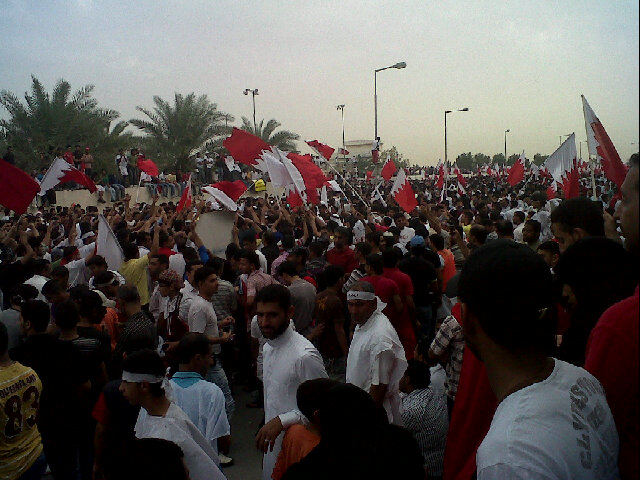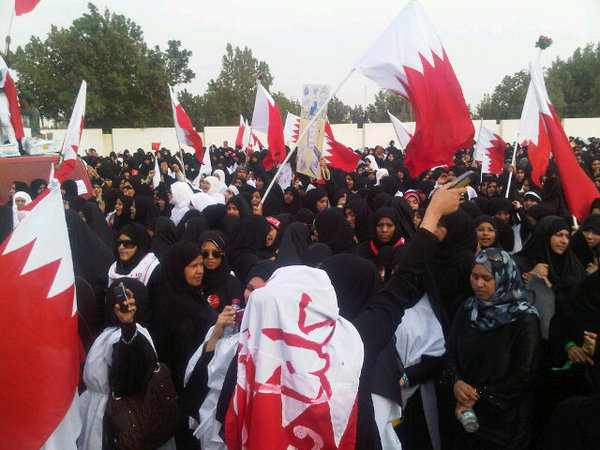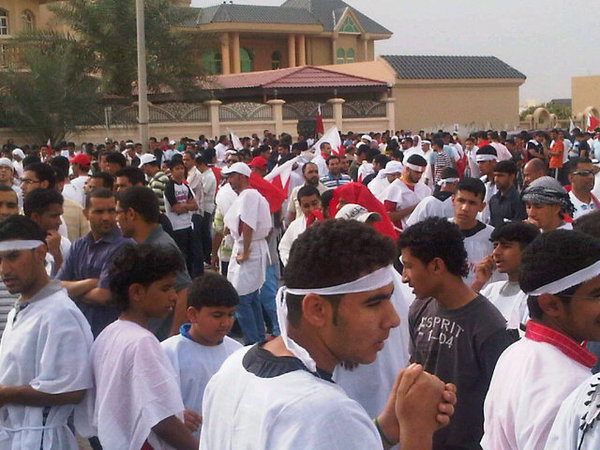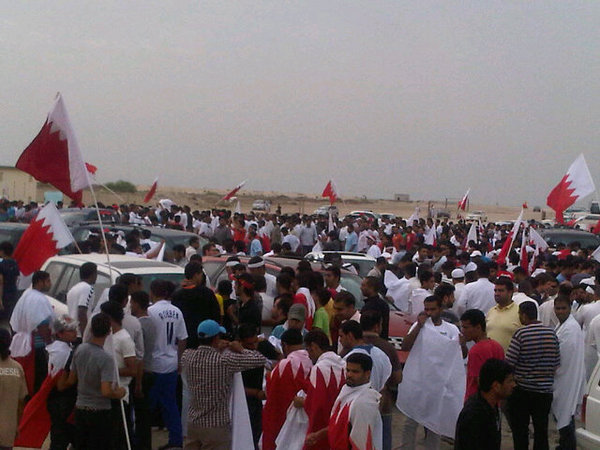2210 GMT: In Egypt, actor and activist Aly Sobhy, whose detention we noted earlier today (see 1430 GMT), has been released.
Sobhy was seized by the military on Wednesday as he tried to get the names of protesters who had been detained in Tahrir Square in Cairo.
2130 GMT: Another video of today's mass pro-democracy march to Safriya Palace in Bahrain:
2020 GMT: Al Jazeera cameramen, Ali Hassan Al Jaber, has been killed after a crew of the Arabic-language channel was ambushed by regime forces near the town of Benghazi.
Reporter Nasser Al Haddar was also injured by a gunshot.
Thousands of people have gathered in Benghazi in a loud protest against the killing and in support of Al Jazeera and the media.
1810 GMT: AFP reports that at least four people have died after police opened fire on protesters in Aden in southern Yemen.
1745 GMT: The Arab League has announced that it supports a no-fly zone over Libya, adding that the zone should be lifted as soon as conflict is over. While it could not get a unanimous vote against the Qaddafi regime, it adds, "We expect the Libya will respect and abide by the decision of the Security Council."
The issue now becomes whether the Security Council will move towards a no-fly zone given the majority support of Arab States for the measure.
Sherine Tadros of Al Jazeera English reports, "Arab League vote for a no-fly zone was opposed only by Syria and Algeria. Arab League still reject any foreign military intervention."1740 GMT: Nic Robertson of CNN reports from the fighting in north-central Libya, "Huge oil fire burning at Ras Lanuf refinery, smoke clouds stretching for ten miles.. appears out of control, no firefighters nearby."
Robertson adds, "Government takes us to Ras Lanuf oil refinery housing complex --- only soldiers here, no civilians left. Hundreds of empty houses & med clinic closed."
1730 GMT: Video of today's pro-democracy march to the King's palace in Bahrain:
1705 GMT: Al Jazeera English is now modifying the earlier report about the Arab League and a no-fly zone over Libya (see 1630 GMT). The channel now says the League will not call for a zone but will ask the UN Security Council to discuss the issue.
Sources say the League could not get a unanimous vote, required under Article 6 of its constitution for a measure "threatening" a member country.
And a photograph of the gathering:
1650 GMT: One of a number of images of protests in Yemen today demanding the resignation of President Ali Abdullah Saleh. The demonstrations persisted despite, and indeed drew strength from, attacks by security forces earlier that killed at least three people.
1630 GMT: The Arab League has called on the UN Security Council to impose a no-fly zone on Libya.
The League has also decided to open channels of communication with the opposition's National Transitional Council. Officials say the League has already been in touch with the insurgents about the situation on the ground.1520 GMT: Al Jazeera English reports, with little detail, that regime forces have retaken Brega in north-central Libya, continuing their reversal of opposition gains last week.
Qaddafi's troops have also launched an attack on the town of Misurata, 210 km (130 miles) east of Libya. An opposition spokesman said, "They are trying to get into Misurata, they are now 10km away. We are hearing shelling. We have no choice but to fight."
1505 GMT: A far different atmosphere around today's pro-democracy protests iN Bahrain: in contrast to the beating of demonstrators by "thugs" on Friday, "protest today at Safriya Palace ended well with [King] Hamad's servants providing dates and water to the protesters".
Meanwhile, US Secretary of Defense Robert Gates has said, after his unannounced visit to Bahrain, that he was encouraged that the King and Crown Prince were ready to take "far-reaching steps". Gates added, "I also said that under the circumstances and with the impulse behind the political and economic grievances across the region, that baby steps probably would not be sufficient...that real reform would be necessary."
To press his point, Gates invoked the spectre of Tehran: "I expressed the view that we had no evidence that suggested that Iran started any of these popular revolutions or demonstrations across the region. But there is clear evidence that as the process is protracted, particularly in Bahrain, the Iranians are looking for ways to exploit it and create problems. So I told them, in this instance, time is not our friend."
1455 GMT: The general secretary of the National Democratic Party, Mohamed Ragab, has expelled 21 members, including a number of businessmen and former ministers.
Former President Hosni Mubarak had already been expelled after he fell from power on 11 February.
Those forced to leave include businessman Ahmed Ezz, former Minister of Industry and Trade Rashid Mohamed Rashid, and former Minister of Interior Habib El-Adly.
Mubarak's son and the head of the NDP's Policies Committee, Gamal Mubarak, turned in his resignation on Thursday.
1430 GMT: A powerful 1st-hand account from Jon Rugman of Britain's Channel 4:
The graves of 20 rebel fighters scattered amid the trees and benches of a little park had been flattened with bulldozers and covered with builders’ sand.I saw the tracks the bulldozers had left behind. And I know there were 20 graves, because I counted them last weekend, when Zawiyah was still in rebel hands.
Those rebels have now vanished. The hospital where we filmed a week ago, full of men close to death from the fighting, is now a no-go zone under the army’s control.
The doctors who once gave me heart-rending accounts of scores shot dead no longer dare speak to the press.
But the apparent desecration of the graves is what disturbs me most. I asked a man with deadened eyes where the dead people had gone. “No people,” he insisted repeatedly, before walking away....
What is obvious is that any UN investigation into war crimes needs to head to Zawiyah as soon as possible, before more of the evidence is buried. Assuming the Libyans let investigators in.
1430 GMT: Lina Attalah of Al Masry Al Youm raises concerns over the detentions of protesters in Egypt, highlighting the case of Aly Sobhy, a member of a street theatre troupe who was prominent in the uprising of 25 January against President Hosni Mubarak.
On Wednesday, Sobhy was seized after he went to Tahrir Square in Cairo to get the details of those detained by the military when they forcibly cleared the square.
Lawyer Raguia Omrani said 190 people were arrested that day. “Since Wednesday, we’ve been chasing the military prosecutor to know the whereabouts of the detainees, but couldn’t get any information,” she noted.
1340 GMT: In Azerbaijan, several hundred opposition protesters have held a rally in downtown Baku for a second consecutive day. The protesters gathered in Fountain Square to shout slogans against Azerbaijani President Ilham Aliyev, including "Resign! Resign!" and "Freedom!"
Police used force in efforts to disperse the rally and arrested several dozen protesters. Authorities have refused permission for rallies downtown, saying they must conduct any protests on the outskirts of the city.
1335 GMT: Unconfirmed reports are coming in of a regime attack upon the opposition-held Misurata, 210 km (130 miles) east of Tripoli.
1330 GMT: A photo of the presence of women in today's protests in Bahrain:
1240 GMT: Mass protests --- and clashes --- continue in Bahrain.
Yesterday, "thugs" allegedly attacked pro-democracy protesters as security forces watched before intervening with tear gas against the demonstrations. A video of men attacking the cars of the protesters:
However, the protesters have convened again to challenge the monarchy, marching on Safriya palace:
1230 GMT: Police in Algeria have again carried out a massive security operation to block marchers calling for an immediate end to President Abdelaziz Bouteflika's regime.
The effort, led by the the National Coordination for Change and Democracy, was smaller this week with only about 40 demonstrators trying to stage a rally. They were surrounded by around 400 police with anti-riot shields and helmets.
This was the fifth Saturday in a row that the protesters have tried unsuccessfully to establish their dissent in the centre of Algiers.
1200 GMT: Minister of Finance Samir Radwan said Egypt will reopen its stock exchange before 28 March so the bourse is not removed from global indices.
Radwan said the continued closure of the stock exchange, which was last open 27 January, was that the situation in Egypt had "not reached the improvement that we were imagining, even though matters are improving every day".
In the latest promise to re-open the exchange, its head, Khaled Serri Seyam, said trading will resume Wednesday, after procedures are established for the injection of LE250 million (more than $42 million) into the stock market.
1145 GMT: Yemeni security forces have killed at least two people and injured at least 13 with gunfire. The clashes began when the forces tried to disperse a protest camp in the capital Sanaa., They continued when police moved against two pro-democracy demonstrations, using tear gas, water cannon, rubber bullets, and live ammunition.
Today's operation came a day after President Ali Abdullah Saleh promised US officials that violence would not be used against demonstrators.
“We finished our morning prayers and then they rushed at us with a water cannon and then live bullets and tear gas,” said protester Sadeq Al Haijazy. “But we are staying here until we die.”
The fighting continued for hours as hundreds of men tried to reinforce the protest's frontlines. Some protesters retaliated by throwing rocks towards sthe ecurity forces, which included around 200 soldiers and plain-clothes officials, breaking pieces of the stone from a barrier that had previously been used to halt the anti-government crowds. A man announced through a bull-horn, “Youth, God is great. We should not retreat.”
Many people lay injured in a mosque. One doctor, Faisal Al Hija, a surgeon who tried to help the wounded, was turned back by soldiers who yelled at him “forbidden".
Reuters is reporting that a 12-year-old youth was also killed in Mukalla.
1135 GMT: Egyptian authorities arrested MP Abdelnasser El-Gabry and Youssef Khattab on Friday on charges of inciting "thugs" to attack protestors gathered in Tahrir Square in Cairo on 2 February.
The two MPs, both members of ousted President Hosni Mubarak's National Democratic Party, allegedly sent men from the area of Nazlet El-Seman, some riding on camels, in an attempt to end the Tahrir sit-in during the uprising against Mubarak.
1125 GMT: The US State Department has said in a letter to Senator Patrick Leahy, the chairman of a Senate panel on foreign aid, that the Obama Administration is "investigating the actions of the Bahraini police and Ministry of Interior forces and assessing their conduct in connection with the protests" that began on 14 February.
The State Department added, "The administration is reevaluating its procedures for reviewing U.S. security assistance and defense sales during periods of domestic unrest and violence and has specifically included Bahrain in this reassessment."
Bahrain's security forces killed several protesters in incidents at and near Pearl Roundabout, the centre of the pro-democracy movement, in the capital Manama. US Secretary of Defense Robert Gates was in Bahrain yesterday to talk to leaders about "regime reforms" (see 0630 GMT).
1005 GMT: The full text of the European Union's statement on Friday deserves a read. It covers North Africa in general, with specific references to Tunisia and Morocco, but this is the passage devoted to the Libyan political and military situation:
The situation in Libya remains a cause for grave concern. We express our strong solidarity with the Libyan people and the victims. We firmly condemn the violent repression the Libyan regime applies against its citizens and the gross and systematic violation of human rights. We welcome UN Security Council Resolution 1970 and the referral of the situation in Libya to the International Criminal Court. The use of force, especially with military means, against civilians is unacceptable and must stop immediately. The safety of the people must be ensured by all necessary means. The European Council expresses its deep concern about attacks against civilians, including from the air. In order to protect the civilian population, Member States will examine all necessary options, provided that there is a demonstrable need, a clear legal basis and support from the region. Those responsible will be held accountable and face grave consequences. We will work with the United Nations, the Arab League, the African Union and our international partners to respond to the crisis. We call for the rapid holding of a summit between the Arab League, the African Union and the European Union.Colonel Gaddafi must relinquish power immediately. His regime has lost all legitimacy and is no longer an interlocutor for the EU. The European Union has adopted restrictive measures against the country's leadership and against entities holding sizeable assets controlled by the regime and stands ready to adopt further sanctions.
The objective is for Libya to rapidly embark on an orderly transition to democracy through a broad-based dialogue. The European Union welcomes and encourages the interim transitional national council based in Benghazi which it considers a political interlocutor. The European Union stands ready to help Libya build a constitutional state and develop the rule of law. It is ready to respond to requests from the Libyan people to assist the restart of the Libyan economy.
0945 GMT: Claimed video of a protester being beaten by "thugs" on Friday in Bahrain:
0645 GMT: At least one person has been killed and 100 injured in Sanaa as Yemeni security forces stormed a protest site where thousands of pro-democracy protesters have camped or weeks.
In the pre-dawn raid, police are said to have used tear gas and hot water mixed with gas. A witness said the dead man, a poet, was killed by live ammunition.
0643 GMT: In Jordan, hundreds of protesters rallied on Friday in Zarka, 25 km (15 miles) northeast of the capital Amman, for economic and political reforms and the dissolution of Parliament. They promised larger demonstrations if their demands were not heard.
The organisers say there were 1500 demonstrators, surrounded by a cordon of police. Authorities said there were 500.
0640 GMT: Amidst the largely peaceful marches of tens of thousands across Yemen on Friday, calling for the resignation of President Ali Abdullah Saleh, police injured 14 demonstrators, including three hit by gunfire.
Security forces used tear gas and live bullets to disperse thousands of people who marched toward Aden's Khor Maksar neighbourhood. The demonstrators were carrying banners, "Ali, Tyrant, Leave" and "For the Sake of Our Martyrs, Leave" as they marched toward the area where foreign consulates are located.
0630 GMT: Catching up with other developments on Friday....
The US Secretary of Defence Robert Gates made an unannounced visit to Bahrain. Press Secretary Geoff Morrell said the trip was to encourage the regime to embrace reforms and carry out talks with opposition groups. At the same time, Gates would give "reassurance of [US] support as well as encouragement of the national dialogue which is in its nascent stages now."
Gates' visit came even as thousands of protesters were marching toward the Royal Court, met by violence from "thugs" as security forces watched. The police then fired tear gas at the demonstrators after they threw stones at their attackers.
The mission appears to fit recent analyses that the Obama Administration is pursuing a strategy of "regime reform", avoiding the "regime change" that took place in Tunisia and Egypt.
0600 GMT: There will be lots of headlines in the US press this morning based on President Obama's declaration on Friday that the "noose is tightening" around Libyan leader Muammar Qaddafi.
The assertion sat somewhat ill-at-ease with the military situation, as regime forces pounded opposition positions in the north-centre of the country. Accounts still conflicted over whether Qaddafi's troops had re-captured the centre of Ras Lanuf, but it was clear that the regime had superior firepower in the battle. And west of Tripoli, confirmation finally arrived that Qaddafi's forces now hold the battered remnants of Zawiyah.
Obama was referring more to the economic and political situation, but while sanctions are being imposed on Qaddafi and the opposition's National Transitional Council is getting some recognition, steps were far from decisive on Friday. NATO pulled back from any intervention, for example, through no-fly zones, and the European Union's leaders also did not specify any steps, even though they agreed that Qaddafy must go. French President Nicolas Sarkozy did suggest "humanitarian zones" for hundreds of thousands of people displaced from revolutions in North Africa, but this appeared to be a tangential --- if important --- suggestion, given the conflict in Libya.



